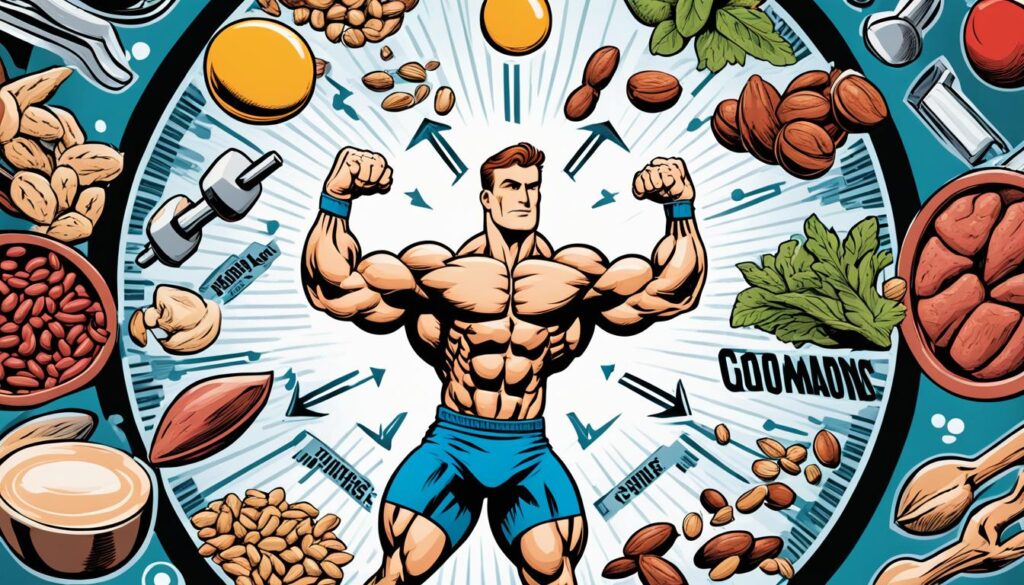How to protein needed to gain muscle
Gaining muscle requires more than just hitting the gym and lifting weights. It also requires the right fuel to support muscle growth and repair. One essential component of that fuel is protein. Protein is crucial for muscle development and plays a vital role in maximizing your muscle growth potential.
Understanding how much protein you need and how to incorporate it into your diet can help you achieve your fitness goals more effectively. In this article, I will guide you through the optimal amount of protein needed for muscle gain and provide practical tips to help you optimize your protein intake.
Key Takeaways:
- Protein is essential for muscle growth and repair.
- The optimal amount of protein needed for muscle gain depends on factors such as body weight and activity level.
- Incorporating protein-rich foods into your diet and planning your meals strategically can help you meet your protein intake requirements.
- Protein can be obtained from various sources, including lean meats, dairy products, legumes, and plant-based sources.
- Consistency is key when it comes to protein intake. Ensure you consume enough protein throughout the day, especially after workouts, to support muscle recovery and growth.
Now that we have discussed the importance of protein in muscle gain, let’s dive deeper into the relationship between protein and muscle growth in the next section.
Understanding Muscle Growth and Protein
In the pursuit of gaining muscle mass, protein plays a critical role. Understanding the relationship between protein and muscle growth is essential for anyone looking to maximize their results. Let’s explore how protein supports the development and repair of muscles and why it is crucial for achieving your muscle growth goals.
When you engage in resistance training or any form of exercise that puts stress on your muscles, tiny damages are inflicted on the muscle fibers. These damages need to be repaired and rebuilt, and protein is the key player in this process. Protein contains amino acids, which are the building blocks of muscle tissue. Consuming adequate amounts of protein provides your body with the necessary amino acids to repair and rebuild the damaged muscle fibers, leading to muscle growth.
In addition to repairing muscles, protein also promotes muscle protein synthesis. This is the process through which new muscle proteins are formed, contributing to muscle growth. Research has shown that increased protein intake is associated with greater muscle protein synthesis, which in turn leads to enhanced muscle growth.
Protein and Muscle Hypertrophy
Hypertrophy refers to the increase in muscle fiber size, and it is a primary goal for many individuals seeking to build muscle mass. To achieve hypertrophy, a positive muscle protein balance is necessary. This means that the rate of muscle protein synthesis should exceed the rate of muscle protein breakdown. Consuming adequate protein ensures a positive muscle protein balance, supporting muscle hypertrophy and facilitating muscle growth.
Moreover, protein consumption has been linked to improved muscle recovery. When you engage in intense workouts, your muscles experience inflammation and oxidative stress. Protein’s anti-inflammatory and antioxidant properties help combat these effects, aiding in muscle recovery and reducing muscle soreness.
“Protein is the fuel that powers muscle growth. Adequate protein intake is essential for repairing damaged muscle fibers, promoting muscle protein synthesis, and supporting muscle hypertrophy.”
It’s important to note that while protein is crucial for muscle growth, it is not the sole factor determining your results. Resistance training, proper rest, and a well-balanced diet are all important components of a comprehensive muscle-building routine. However, protein intake remains a fundamental element that cannot be overlooked.
To ensure optimal muscle growth, it is recommended to consume an adequate amount of high-quality protein throughout the day. The exact protein intake needed varies depending on factors such as body weight, activity level, and individual goals. Consulting with a registered dietitian or a fitness professional can help determine the specific protein requirements for your unique needs.
Now that we’ve established the importance of protein in muscle growth, let’s move on to the next section and explore how to determine your protein intake needs for maximizing your muscle-building potential.
Determining Your Protein Intake Needs
When it comes to building muscle, determining the right amount of protein intake is crucial. Adequate protein consumption provides your body with essential amino acids, which are the building blocks for muscle growth. However, the exact protein needed to gain muscle varies from person to person.
Several factors influence your protein intake requirements, including your body weight and activity level. It’s important to calculate your protein needs accurately to ensure you provide your muscles with the necessary nutrients for optimal growth. To determine your ideal protein intake, consider the following:
- Body weight: Your protein needs are typically based on your weight. As a general guideline, aim for approximately 0.7 to 1 gram of protein per pound of body weight.
- Activity level: The more physically active you are, the more protein your body requires. If you have an intense workout routine or engage in regular strength training, you may need to increase your protein intake accordingly.
- Specific goals: Your protein needs may also depend on your specific fitness goals. If your primary focus is muscle growth, you may need to consume a higher amount of protein compared to someone aiming for weight maintenance or fat loss.
Keep in mind that these recommendations are general guidelines. Consulting with a nutritionist or healthcare professional can provide personalized insights into your protein intake needs based on your individual goals and health factors.
Example Protein Intake Calculation:
| Body Weight (lbs) | Protein Intake (grams) |
|---|---|
| 150 | 105 – 150 |
| 180 | 126 – 180 |
| 200 | 140 – 200 |
Remember, meeting your protein intake requirements is just one aspect of a well-rounded fitness routine. It’s essential to combine protein consumption with regular exercise, proper hydration, and a balanced diet to support your overall muscle growth goals.
Optimizing Protein Intake for Muscle Growth
When it comes to building muscle, optimizing your protein intake is essential. Protein provides the building blocks necessary for muscle growth and repair, making it a crucial component of any muscle-building routine. Whether you’re working out in a gym or at home, there are various strategies you can implement to ensure you’re maximizing the benefits of protein for your muscles.
Explore Different Sources of Protein
To optimize your protein intake, it’s important to diversify your protein sources. Incorporating a variety of protein-rich foods into your diet ensures you’re obtaining a wide range of essential amino acids, which are the building blocks of muscle tissue. Consider including the following protein sources in your meals:
- Lean meats like chicken breast or turkey
- Fish, such as salmon or tuna
- Dairy products like Greek yogurt or cottage cheese
- Plant-based proteins like tofu, lentils, or quinoa
By including a mix of animal and plant-based proteins, you can provide your body with a comprehensive array of amino acids needed for optimal muscle growth.
Incorporate Protein Into Your Daily Routine
To ensure you’re consistently meeting your protein needs, it’s essential to incorporate protein-rich foods into your daily routine. Here are some practical tips:
- Start your day with a protein-packed breakfast, such as eggs or a protein smoothie.
- Include a protein source in each meal and snack throughout the day.
- Plan ahead by prepping protein-rich meals and snacks for easy access, especially when you’re on the go.
- Consider incorporating protein supplements, like whey protein powder or protein bars, when needed.
By making protein a priority in your daily routine, you can ensure a consistent intake that supports muscle growth and repair.
Stay Consistent with Your Protein Intake
Consistency is key when it comes to optimizing protein intake for muscle growth. Whether you’re following a specific muscle-building program or designing your own workouts at home, make sure you’re fueling your body with the necessary protein it needs to support muscle repair and growth. Remember to adjust your protein intake based on your activity level and individual goals.
“Protein is the foundation for muscle growth. By optimizing your protein intake, diversifying your sources, and incorporating it into your daily routine, you can support your muscle-building goals.”

| Protein Source | Protein Content per Serving |
|---|---|
| Chicken Breast (4 oz) | 35g |
| Greek Yogurt (6 oz) | 18g |
| Tofu (3 oz) | 8g |
| Salmon (4 oz) | 22g |
| Lentils (1 cup) | 18g |
Conclusion
In conclusion, protein plays a vital role in achieving muscle gain and maximizing your fitness goals. Throughout this article, we have explored the importance of protein in supporting muscle growth and repair. It is clear that protein is an essential nutrient for individuals looking to build muscle mass.
To benefit from protein’s muscle-building properties, it is crucial to incorporate a well-balanced diet that includes sufficient protein intake. Determining your protein needs based on factors such as body weight and activity level is key to optimizing your muscle growth potential.
Whether you are working out at the gym or from the comfort of your home, it’s essential to ensure a consistent protein intake. Incorporate a variety of protein sources such as lean meats, poultry, fish, eggs, dairy products, legumes, and plant-based alternatives into your meal plan.
Remember, achieving muscle gain is a journey that requires dedication and consistency. By prioritizing protein intake and maintaining a well-balanced diet, you can fuel your body for optimal muscle growth and see the results you desire. Stay committed to your fitness goals, and the benefits of protein will help you on your path to a stronger, healthier you.
FAQ
How much protein do I need to gain muscle?
The optimal amount of protein needed for muscle gain varies depending on factors like body weight and activity level. However, a general recommendation is to consume around 0.8 to 1 gram of protein per pound of body weight. This ensures that you are providing your muscles with enough amino acids to support muscle growth and repair.
How does protein contribute to muscle growth?
Protein is essential for muscle growth because it provides the building blocks for muscle tissue. When you consume protein, your body breaks it down into amino acids, which are then used to repair and build new muscle fibers. Protein also supplies your body with essential nutrients that support the recovery and growth of muscles after exercise.
How can I determine my protein intake needs?
To determine your specific protein intake needs, you should consider factors such as your body weight, fitness goals, and activity level. As a general guideline, aim for a protein intake of approximately 0.8 to 1 gram per pound of body weight for optimal muscle growth. However, consulting with a registered dietitian or nutritionist can provide you with more personalized recommendations based on your individual needs.
How can I optimize my protein intake for muscle growth?
To optimize your protein intake for muscle growth, consider incorporating a variety of protein sources into your diet. This can include lean meats, poultry, fish, eggs, dairy products, legumes, and plant-based protein sources. It’s also important to distribute your protein intake evenly throughout the day, including before and after your workouts, to provide a constant supply of amino acids to your muscles. Finally, consider using protein supplements, such as whey protein, to help meet your protein needs efficiently.
What role does a well-balanced diet play in muscle gain?
A well-balanced diet is crucial for muscle gain as it provides your body with the necessary nutrients, including protein, carbohydrates, and fats, to support muscle growth and recovery. While protein is essential for muscle building, a balanced diet ensures you receive a variety of nutrients that promote overall health and support your fitness goals. Additionally, carbohydrates are important for fueling your workouts, and healthy fats help with hormone production and nutrient absorption.
